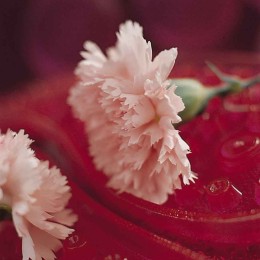Hot Stuff
Those TV captions and subtitles are a reliable source for misspellings. Sometimes they're done live, and then you often get a hash of words as the poor typist tries to keep up with the newscasters and the live sporting events. Pre-recorded shows are a little more reliable, but all too often you find typos that emerge from the hands of someone who just isn't familiar with a particular word, and so substitutes what they thought they heard for what was said.
I was idly watching a cooking show on PBS this afternoon before work, and the host sprinkled cayenne pepper into a saucepan. The transcriber, though, heard something else entirely, and the subtitle read, instead, "cyan". I feel a little sorry for deaf people who have to rely on something like that when they go shopping.
"Cyan" is entirely straightforward: it comes from the Greek "kyanos", "dark blue".
"Cayenne", as in the pepper, is something else altogether. You'd think it comes from Cayenne Island, the capital of French Guiana, wouldn't you? But you would be wrong. I know I was. The word "cayenne" comes from the Brazilian indigenous people the Tupi: their word for the pepper is "quiinia". It sort of sounds like English "cayenne", and we got our spelling from Cayenne Island--but not the word itself, nor the pepper. We just thought the one sounded like the other, and so applied what looked like the appropriate spelling. All a mistake, really, but an enduring one.
While I'm at it: the word "cyan" appears as part of another common English word, "cyanide", so named because it was used in the manufacture of a bright blue dye. (Another word, slightly less common, is "cyanosis", the bluish tinge the skin takes on when it's starved of oxygen. By an interesting coincidence, cyanide poisoning causes cyanosis--but the one didn't take its name from the other.)



